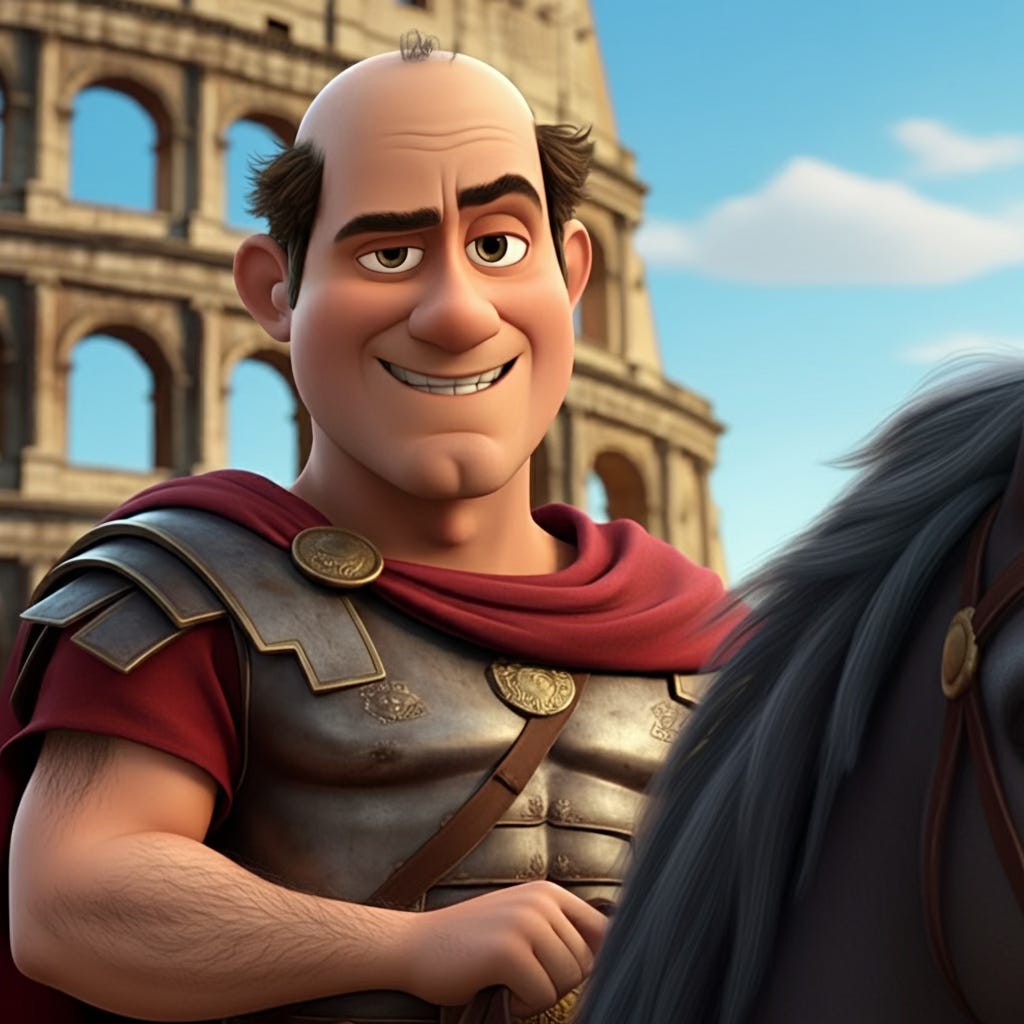
We have already learned how President Trump resembles Emperor Domitian and what that might mean for remnant Christianity. Now, with the appointment of Matt Gaetz, who lacks the experience, ethics, and temperament to be Attorney General, we have the opportunity to see how Trump resembles another emperor, Caligula.
But first, let’s take a step back. Is America really an empire?
I suggest yes, given its history of economically and militaristically bending peoples (internal) and nations (external) to its will — against their will. Within this understanding, perhaps we should think of Presidents (all of them) as Emperors, the Pledge of Allegiance as an offering to Rome’s patron god, Jupiter (often symbolized as an eagle clutching thunderbolts), the Constitution as its sacred religious text, and national holidays (Independence Day, Thanksgiving, Christmas, etc) as cultic feasts.
These associations might sound radical, but let it ferment for a bit and come back to it in a week. Now, on to the rest of the article.
Emperor Little Boots
Gaius Caesar Augustus Germanicus, known to history as Caligula, succeeded Tiberius as the third emperor of the Julian/Claudian dynasty of Roman Emperors. A caliga was a boot worn by Roman soldiers up to the officer rank. At two years old, Gaius and his mother were taken hostage by Roman soldiers during a mutiny in 14 CE. He was nicknamed ‘caligula’ (little boot) because he was dressed up in a miniature version of full military gear.
He hated the nickname. After he became emperor in 37 CE, he would punish anyone who used it.
While there is scholarly debate about whether Caligula would actually appoint his horse, Incitatus, to the second highest office in the Empire, the historical record reflects a strong perception that Caligula preferred to elevate those loyal to him over those who were competent and principled to do the job well. And if there was no one sufficiently loyal, he’d prefer a loyal animal he could bridle and control.
While this is the perfect setup to liken Matt Gaetz to Trump’s horse, or at least call him a horse’s ass, I won’t. First and foremost, we should see every human being as a child of God, and it is obvious (and heartbreaking) that Matt has lacked access to an authentic and transformational Christian community. Let us pray for a Pauline story arc.
Moving on.
It seems a lot of these emperors had physical insecurities. Suetonius, writing in Life of Caligula, described the emperor’s physical appearance,
“He was very tall and extremely pale, with an unshapely body but very thin neck and legs. His eyes and temples were hollow, his forehead broad and grim, his hair thin and entirely gone on the top of his head, though his body was hairy. Because of this, to look upon him from a higher place as he passed by, or for any reason whatever to mention a goat, was treated as a capital offense.”
So his physical characteristics include being thin-skinned, balding, needing a sun tan, and having an unshapely body. Despite those physical realities, he was attractive enough to rack up several marriages despite rumors of him sleeping with his favorite sister, Drusilla. His third and last marriage was to his mistress from the previous marriage, Melonia (no, not Melania — we’re talking about Caligula here…right?).
Within a year of coming to power, Caligula had drained the nation’s substantial monetary reserves. To raise funds, he turned to taxes (tariffs?) and extortion. He also commercialized everything he could, even turning to real estate to lease out a wing in the imperial palace to a high-end brothel.
Conclusion
So, what are we to make of these details and similarities?
Trump is not Domitian. Nor is he Caligula. But his similarities help us draw contrasts and connections to see our reality more clearly.
After the Babylonian exile, Babylon started to become prophetic shorthand in the Bible for any nation that embodied empire-like behavior. Babylon was Babylon, Egypt was Babylon, the Seleucids were Babylon, and Rome was Babylon. In Revelation, future empires are Babylon because they all follow the same playbook and exhibit the same ethos — no matter how incrementally better the next one may be.
After the writing of Revelation, Babylon has continually resurrected, and Christianity has kept entangling itself with it. The Byzantine Empire was Babylon. The British Empire was Babylon. Nazi Germany was Babylon. America is Babylon. And that means the leaders of America (both Democrat and Republican) will necessarily have more in common with leaders of Babylon than an itinerant Jewish teacher preaching love, justice, and hope in the shadow of the empire.
I actually find this insight comforting. Because that means Christians have been here before. And we have the examples of a teacher and his disciples to guide us.
Preston Sprinkle, in his book Exiles, writes about the concept of “subversive submissiveness” and writes, “The radical ethic of peace, sacrifice, and enemy love is incompatible with the coercive power of earthly governments. When followers of the Lamb join the beast in an effort to transform society, they often end up looking more like a beast than a lamb.”
Let’s aspire to live like lambs today, this month, and the years to come by finding ways to become holy troublemakers in our communities. Act justly. Love mercy. Walk humbly.


